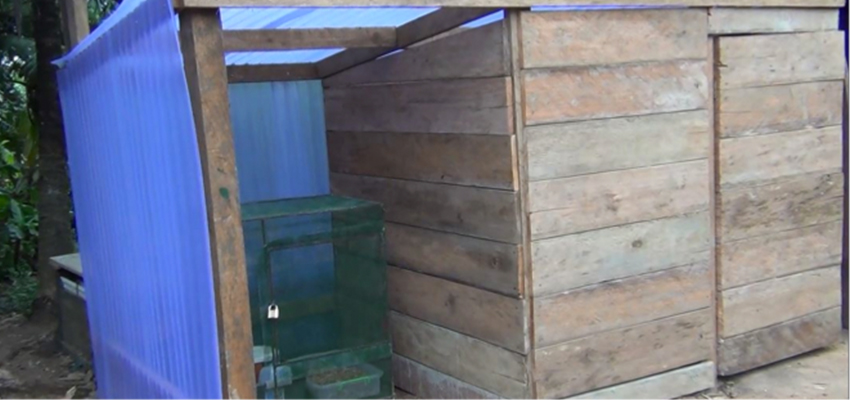
Spencer Wenck was a student in D-Lab: Supply Chains in fall of 2015. For that class, Spencer worked closely with D-Lab: Waste instructor Libby McDonald on this project. He traveled to Nicaragua during the 2015 Independent Activities Period.
-----------------------------------------------------------------
Poor sanitation infrastructure in developing countries
Poor sanitation infrastructure in developing countries can be harmful to the people and the environment, and the appearance of streets and neighborhoods. Some of the primary ways in which waste is handled are to dump it, burn it, or put it out on the street for animals to eat or until the rain washes it into gutters.
Breaking down waste in Nicaragua
Recyclables makes up less than 20 percent of all the waste generated in Nicaragua, with roughly 75 percent of all waste being organic waste. Thus, over 80 percent of the waste ends up in dump sites that contaminate the environment and incubate pathogens.
Efficient composting of organic waste for animal feed and compost
My project in Nicaragua utilizes a powerful native insect to quickly compost organic waste while generating animal feed and compost. While organic waste could always be composted, the traditional process takes several months and yields a mere soil amendment. “Cheap as dirt” is an expression for a reason, and there is little (or no) money to be made from composting. In fact, the city that I visited - Bluefields, Nicaragua - had attempted to institute a composting facility as a means of revenue for the city. After draining taxpayer dollars for a couple years, the facility was shut down.
Putting the black soldier fly to work on waste
My project on the other hand both processes organic waste in a matter of days and produces a product that is much more valuable: animal feed. The process utilizes the black soldier fly (BSF) to consume organic waste producing residual non-digestible material (compost) and more flies. The excess flies can be used as a natural and high-protein animal feed for poultry and fish.
Although this process has been demonstrated at a small scale in developed countries as a back-yard method to compost kitchen scraps, this process has the potential to operate at an industrial level, to generate jobs and revenue, and to provide an incentive for collection and sanitary disposal of organic waste. While I was in Bluefields, I found that there was an incredible market opportunity for my project, and I also successfully built a small pilot project with the help of the local waste-picking cooperative that was formed with the help of MIT D-Lab many years ago.
Establishing the need for chicken feed in Bluefields
When I began my market research, I found the demand for chicken and eggs to be very large. Furthermore, I found that these chicken products were also very expensive (more than they are here in the US). When I tried to find out who the main supplier of all the eggs and chickens were, I found out that there was no commercial production in or even near Bluefields. The only commercial products were shipped from the US!
As I tried to determine why such an inefficient system was in place, I learned that raising chickens in Bluefield was simply not profitable. Grain such as corn and rice was available, but there was no supply of high-protein animal feeds. As a result, Bluefields was importing chicken products from local subsistence farmers and abroad. If high protein animal feed could be produced locally and cheaply, a local chicken industry would not only benefit, but would be made possible.
Encouraged by the fact that animal feed was in demand (not to mention the need for a means of disposing organic waste), I worked to build a small pilot system for recycling organic waste with the black soldier fly.
Partnering with Luz del Futuro waste picking cooperative
One of the first things I did in Bluefields was to visit the women of Luz del Futuro (LdF), the local waste picking cooperative. While I was visiting the women at the municipal dump site (where all the garbage that is actually collected ends up) on my second day in Nicaragua, we spotted the BSF. From that point forward, we spent weeks searching for and collecting the amazing insect as well as building a system to recycle organic waste. In the end, we built a fly cage to breed the BSF, we built a large composting unit to recycle organic waste and harvest the BSF, and we built a chicken coop so that we could prove that a thriving poultry industry fueled by our animal feed could be possible and profitable!
In conclusion . . .
Overall, my trip to Bluefields was enlightening and rewarding. Besides proving the economic need and viability of my project, I also initiated a joint research project with the local university to help conduct research on the human health and environmental implications of using the black soldier fly to convert organic waste into animal feed and compost. And, I built a pilot composting system that is currently being operated by the women of Luz del Futuro to compost small amounts of organic waste and lay the foundation for a larger scale implementation of the project.

